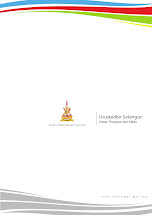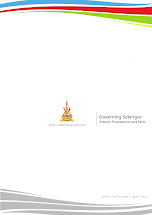Taken from http://www.kinibiz.com/story/corporate/51546/race-profiling-in-housing-%E2%80%98irrational%E2%80%99-says-hba.html
Race profiling in housing "irrational", says HBA
STORY BY
KHAIRIE HISYAM
KHAIRIE@KINIBIZ.COM
The establishment of a Bumiputera Development Unit (BDU) in the Ministry of
Urban Wellbeing, Housing and Local Government to monitor issues related to
bumiputera housing quota has drawn flak from the National House Buyers
Association (HBA).
Yesterday, the Minister of Urban Wellbeing, Housing and Local Government Abdul
Rahman Dahlan said that the BDU will discourage housing developers from opting
out of building affordable homes for the community.
“There had been occasions where housing developers asked that they be allowed to
sell off unsold bumiputera-reserved units as ordinary units,” said Abdul Rahman.
“BDU will monitor and discourage such action; we will scrutinise whether they had
advertised about the houses and if they did, whether the adverts were placed in a
little corner that was hardly noticeable,” added the housing minister.
When contacted by KiniBiz, the HBA feels that it is an “irrational” move by the
government to profile races and disagrees with the government‟s initiative to profile
races when it comes to housing matters.
“Anyone who deserves a house under the affordable houses category should get a
house irrespective of race,” said HBA honorary secretary-general Chang Kim Loong,
who declined to elaborate further.
Real estate researcher Professor Ting Kien Hwa, however, points out that the agenda
has already been done before under various agencies such as the Selangor State
Development Corporation (PKNS) and Urban Development Authority (UDA).
“I am wondering how, this time around, we can achieve this objective,” said Ting,
who heads the Centre for Real Estate Research (CORE) at Universiti Teknologi Mara
(UiTM).
Ting further points out that based on past experience, the problem has been that
many Bumiputera house buyers are reluctant to purchase Bumiputera-allocated
units in housing developments despite the discounted price.
“They find themselves restricted when they want to sell the property as they can only
sell to another Bumiputera,” said Ting to KiniBiz, explaining that this leads to many
Bumiputera buyers preferring open market titles.
This preference is further augmented by the market wisdom that open market titles
usually command higher prices than Bumiputera-restricted titles, often by more than
the Bumiputera discount amount.
This is the underlying problem that needs to be addressed, said Ahyat Ishak, founder
of the Pejuang Hartanah program which aims to promote property ownership and
investment among Malays.
While Ahyat feels the housing minister is the right person to address the issues and
challenges in the housing industry including excessive speculation, he expressed
concern that this initiative may not necessarily solve the problem of Bumiputera
ownership of property.
“Personally, I feel that there is a deeper problem to solve based on my observation,”
said Ahyat to KiniBiz. “You have got to create the desire in Malays themselves to
want to buy property — the Chinese (for example) are already invested in the
property market and the next frontier (of market growth) will be when Malay
involvement in the property market reaches critical mass.”
“You can lead a camel to water, but you can‟t make it drink,” added Ahyat, explaining
that the avoidance of Bumiputera-allocated units is perhaps due to the lesser
participation of the Bumiputera themselves in the property market. “I always say in
my talks that one shouldn‟t call oneself a Malay in Tanah Melayu if one does not own
property.”
At press time, the Real Estate and Housing Developers‟ Association (Rehda) has not
responded to emailed queries from KiniBiz.
However, according to the findings of Rehda‟s1H2013 Property Industry Survey, 55%
of the survey‟s 150 respondents indicated that they have unsold units with 16%
saying that these unsold units are severely impacting their company‟s cash flow.
In addition, most of these respondents cited unreleased Bumiputera lots as the main
reason for these unsold units.
“There is no timeframe for the release of these Bumiputera quotas, so the developers
are hard-pressed,” said Anthony Cho, chairman of the Malacca branch of Rehda,
earlier this month when speaking at the media briefing of the 1H2013 Property
Industry Survey‟s findings.
“That is why I (have) advocated very strongly to the state government that by having
a rigid Bumiputera quota, you are forcing the developers to move away from the
affordable housing (segment),” said Cho. “Because of the Bumiputera quota, if they
cannot sell then they‟ll go to the higher end market to make better profits.”
It is worth noting that the BDU in the housing ministry would fall under the federal
government whereas land and property matters are for the most part under the state
governments‟ control.
Therefore the BDU would “still need to work with the state governments”, said
property lawyer and author Khairul Anuar Shaharudin.
“The BDU does have legal power because as part of the ministry, they are responsible
in implementing federal government policies,” commented Khairul Anuar further
when asked whether the unit would have the necessary legal framework to empower
it.
Abdul Rahman‟s announcement came as Deputy Finance Minister Ahmad Maslan
stressed the urgent need to establish such units in every ministry to support
Bumiputera economic development.
“We (the Bumiputera) are the majority and if the government assists the majority,
others will also benefit,” Ahmad Maslan was quoted as saying. “We need to be
proactive in forming the (BDUs) as Bumiputeras had been left behind for the past 50
years.”
Ahmad Maslan was further quoted as saying that the BDU‟s organisational structure
will be detailed by the Economic Planning Unit (EPU) and the Bumiputera Agenda Steering Unit (Teraju) while the upcoming Budget 2014 will take into account
allocation for BDU.
The establishment of these units is part of the recently announced Bumiputera
economic empowerment initiative unveiled by prime minister Najib Abdul Razak on
Sept 14, 2013, which economists had criticised as lacking foresight and not
addressing fundamental issues at the core of the problem.
My Selangor Budget 2017 Wishlist
8 years ago






